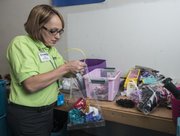Sarah Pine left prison in 2010 with seven felony convictions, no job prospects, little money and three young children somewhere in foster care. She stood no chance of regaining her parental rights unless she put a life together.
Pine, now 33, of Fayetteville went to live in the only place that would take her, her stepfather's home. Her mom was gone, Pine said, dead at 47 from pills and whisky. Her mother died while she was in prison.
"It wasn't a healthy place to be for somebody who was trying to stay drug and alcohol-free," said Pine, who's now an assistant manager at the Goodwill Industries Store in Springdale. "I had nowhere else to go."
Angie Whitehorn of Springdale had a living mother to come home to after making parole in August, but that presents its challenges too.
"I'm 41 years old and living with my mother," she said.
That's a problem, Whitehorn said, because having everything taken care of allowed irresponsible behavior before. She went to prison after overdosing for the third time. She also has yet to pay for her own car insurance, she said. Now she's trying to make a life for herself, but has a prison record.
Every time she has a renter's application rejected, Whitehorn said, "I want to tell them, 'This is what I did, but it is not who I am.'"
Too often, felons leaving prison have no place to go but back to the where they came from -- if they have that, said Pine, Whitehorn and other felons interviewed. Homeless or back in the place they started are bad beginning points when trying to break a cycle, they said.
Almost half the people released from Arkansas prisons go back within three years with new charges, state figures show. A safe environment to live in would help ex-prisoners re-launch into regular life more than any other factor, said four former prisoners. A job matters -- they can't keep a place to live without one -- but even felons who find a job often go home to a bad environment.
"I have relatives who tell me, 'Hey, come see me. I want to see you," Pine said. "I always give them the same answer: 'Great. I have a NA (Narcotics Anonymous) meeting at 8 a.m. Come there if you want to see me.' They haven't yet, not one."
Apartment owners and managers run criminal background checks and are often unwilling to rent to people with any criminal record, Whitehorn and Pine said. That's true but changing, said Gail Bluckner of Jacksonville, executive director of the Landlords Association of Arkansas. Bluckner also works for a company that does background checks on prospective tenants, she said in a telephone interview.
"People are realizing that if people are 35 years old and have been responsible for years, it doesn't make sense to hold something against them they did when they were 22," she said. "It's getting harder and harder to find good tenants. It's also getting harder to find people with completely clean records."
There is mounting pressure to take landlords' access to criminal backgrounds away, Bluckner said, because denial of leases to people with any criminal record has become so common.
"We don't want to lose that because there are people with very serious criminal histories out there, and crimes like sex crimes that we want to be aware of," she said.
Ex-prisoners' challenges do not end once they find a place, said Larry Brooks, 56, of Fayetteville. "I got out of prison in Texas and 2003, and found work here," he said. "I found a some people who were willing to give me a chance, and I appreciated it. I lived in the same apartment for 10 years. Then they sold the apartment building to new owner who ran a background check on everybody. I was out. I found another place to live -- after paying more than $1,000 in application fees."
At least 26 people representing nonprofit groups and state agencies met at the Fayetteville Public Library on Thursday afternoon. Goodwill staff members Joe Bruton, a prisoner re-entry coach who also has a felony conviction on his record, and program specialist Paige Eddinger organized the effort to address housing and other challenges with prisoner re-entry.
Thursday's meeting was the relaunch of the Northwest Arkansas Re-entry Coalition, a wider effort to bring a state-approved re-entry center to the area and provide other local solutions to re-integrating returning prisoners.
Goodwill's Transitional Employment Opportunity program claims a 93 percent success rate in Northwest Arkansas for keeping people in the program out of prison, but it covers a fraction of the returning prisoners, Bruton and Eddinger said. The local chapter of that program serves Benton, Madison and Washington counties.
"Northwest Arkansas has a population of 500,000 people and not one transitional house of any size," Bruton said. "That's almost embarrassing. We have 70 people a month coming back here from state prisons, and that figure is a couple of years old."
Some state money is available to operate "re-entry centers." These are places where state prisoners who are due for parole can live and be supervised and gradually adapt to life outside of prison. They receive counseling and job training. There is state taxpayer money available to communities for operating such a center, but none for acquiring the building such a center must have. Any such building would need offices, conference rooms, classrooms and residential space.
Jon Comstock of Rogers is a mediator and former circuit judge who attended Thursday's meeting. He said he looked at the money the state offers and the requirements it demands.
"I've taken this plan to a half dozen businessmen, and they all say they can't make this work," Comstock said.
Even a donated building would require an architect to inspect it and draw up plans for conversion, he said. Comstock said he has visited two re-entry centers in Arkansas -- one in Conway and another in Newport -- that are up and running. They were existing, nonprofit transition programs for prisoners that largely met the qualifications for a re-entry center already and had paid-for buildings, he said.
Even if a suitable building is found and can be acquired, establishing a re-entry center can be controversial, organizers at Thursday's meeting said. A re-entry center sounds like a great idea until a site is picked. Then neighbors object.
"They are already in your back yard," said Kris A. Eglin, parole and probation officer for the region.
When prisoners are released, they go home of to the relatively thriving economy of Northwest Arkansas from other places, looking for work, he said. If they don't succeed, the crime that results is a much bigger problem than having a re-entry center nearby.
Re-entry of ex-prisoners is not a state problem, but a community one, organizers said. Washington County Sheriff Tim Helder, who did not attend Thursday's meeting, made the same point in an Oct. 28 interview about the backlog of state prisoners in the county jail.
"You can have all the programs, training and counseling in the world, and it won't do any good if people getting out of prison can't get a job," Helder said in an interview in his office. "We have got to help people get on their feet, or we can't fix this, and that's going to take a community approach."
Providing such a community approach is what Thursday's initial meeting was about, Eddinger said. The group hopes to organize and meet regularly, she said.
Thursday's turnout was extremely good not just in numbers but from the variety of expertise and community support the attendees represented, said Patrica Sims of Little Rock, re-entry manager for the Arkansas Department of Community Correction. She attended Thursday's meeting.
"You have about every component you need to start a re-entry center in this room right now," Sims told the group. She acknowledged finding a site was key, but said there was enough support to run a successful one if Thursday's participation was any indication.
NW News on 11/15/2015



